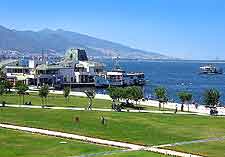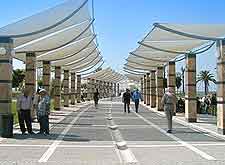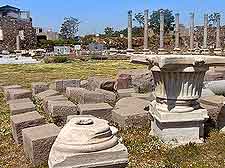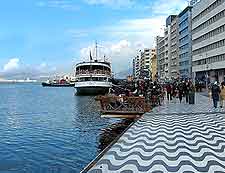Izmir Landmarks and Monuments
(Izmir, Turkey)

Being such an old and important Turkish city, it is hardly surprising that tourists will be somewhat enamoured by the sheer quantity and quality of ancient landmarks and Ottoman monuments found within the Izmir region. The Agora is one of Izmir's most ancient landmarks and was actually originally constructed for Alexander the Great over 2,300 years ago, when it served as a busy marketplace and setting for local gatherings.
Other very prominent landmarks in Izmir include the Clock Tower on the Konak Square, which is known locally as the 'Saa Kulesi' and is especially exotic in its appearance. A number of Jewish synagogues add further character to the city, while the Kadifekale Castle is hard to miss, since it enjoys an obvious elevated hilltop setting.

Konak Square (Konak Meydani) and Clock Tower (Saa Kulesi)
Address: Konak Square, Izmir, Turkey, TR
The Konak Square is a spacious traffic-free public plaza and earned its name after the Turkish Ottoman government mansion known as the 'hukumet konagi'. Particularly surprising at the Konak is the landscaped cactus garden, while the historical clock tower presides over the plaza and originates from the turn of the 20th century, when it was donated to Izmir by Sultan Abdul Hamit II. The clock tower is an unusual landmark, being rather ornate and oriental in style, with no less than four fountains surrounding the base. A number of mature palm trees provide a Mediterranean flavour around the square, while the Konak Camii lies next door and dates back more than 250 years.
Open hours: daily - 24 hours
Admission: free

Agora of Smyrna / Agora Open Air Museum
Address: Agora Caddesi, Izmir, Turkey, TR
Following serious earthquake damage in the 2nd century, the Agora was completely reconstructed by the Roman emperor of the time, Marcus Aurelius. Despite its considerable age, the Agora of Smyrna remains in a very good state of repair, with many Colonnades of stone Corinthian columns still standing today and providing a clear indication of how a Roman bazaar once appeared. Surrounding this ancient landmark is the remains of a Muslim cemetery, with a number of old tombstones being dotted around the perimeter. The Agora is easy to find and can be reached along the Anafartalar Caddesi, with free brochures ensuring that you will make the very most of your visit.
Open hours: daily - 08:00 to 17:00
Admission: free
Synagogues
Address: Karatas (Jewish Quarter) or Havra Sokak, Izmir, Turkey, TR
In total there are actually nine individual synagogues residing within the city of Izmir and offering a taster of the city's rich Jewish heritage. These synagogues stand within the Jewish district known as the 'Karatas', or lining the Synagogue street of Havra Sokak. Most of these synagogues feature 19th-century architecture, being renovated or built during this period.
Open hours: daily
Admission: free

Kordon
Address: Kordon, Izmir, Turkey, TR
The Kordon is located alongside the Alsancak docks and to the south of the Konak Meydani, which has become something of a famous local waterfront landmark and in recent years actually came exceedingly close to becoming a motorway. However, the Kordon was saved and is the perfect place for a stroll, a horse and carriage ride onboard a traditional Turkish 'phaeton', or to simply watch the bayfront activity or the sun set. A large expanse of open parkland edges the Kordon and is highly suitable for picnicking.
Open hours: daily - 24 hours
Admission: free
Kadifekale Castle
Address: Kadifekale, Izmir, Turkey, TR
Sited at the top of the hill of the same name, the ruined Kadifekale Castle literally translates as the 'Velvet Castle' and is situated some 2 km / 1 mile from the coastline, where it offers breathtaking panoramas across the urban cityscape. These ancient fortifications crown the hilltop and are connected by frequent buses, with many tourists choosing to take Bus No. 33 to the top, and then walk down after exploring the sight and enjoying the views. Alongside the Kadifekale are the remains of some Roman cisterns, which were restored during the Byzantine era.
Open hours: daily
Admission: free
 Being such an old and important Turkish city, it is hardly surprising that tourists will be somewhat enamoured by the sheer quantity and quality of ancient landmarks and Ottoman monuments found within the Izmir region. The Agora is one of Izmir's most ancient landmarks and was actually originally constructed for Alexander the Great over 2,300 years ago, when it served as a busy marketplace and setting for local gatherings.
Being such an old and important Turkish city, it is hardly surprising that tourists will be somewhat enamoured by the sheer quantity and quality of ancient landmarks and Ottoman monuments found within the Izmir region. The Agora is one of Izmir's most ancient landmarks and was actually originally constructed for Alexander the Great over 2,300 years ago, when it served as a busy marketplace and setting for local gatherings.

